It’s cold here. It’s been a week since we lost electric power in the small towns of central Connecticut. Last Saturday we were caught by a freak storm that dumped eight inches of heavy wet snow. The beautiful trees, still sporting their fall foliage, held the heavy snow on their leafy branches until they could bear the weight no longer and snapped. Huge limbs and entire trees crashed to the ground, pulling electric wires down with them.
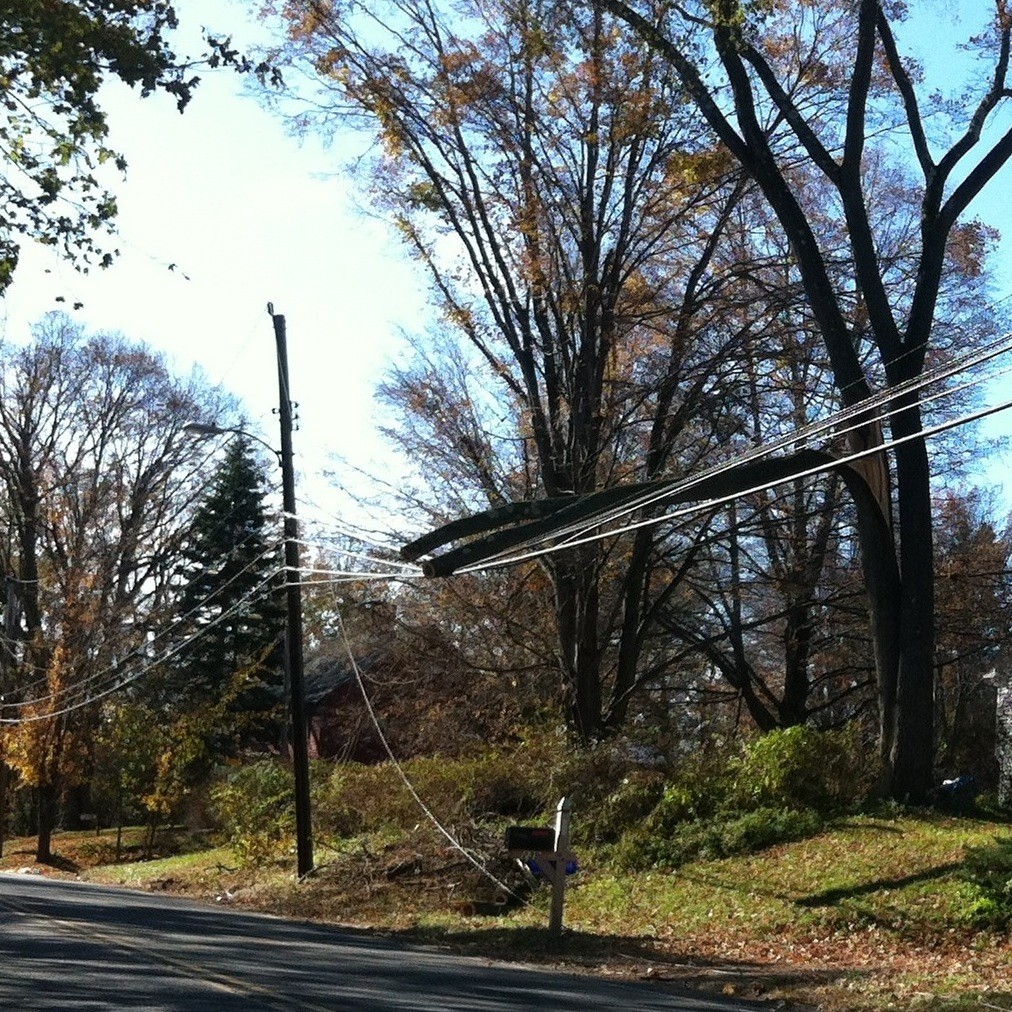
Two days after the storm, a half million people were still without power – check out the black areas on the map below.
And today, a week later, 200,000 people are still without power, my town included.
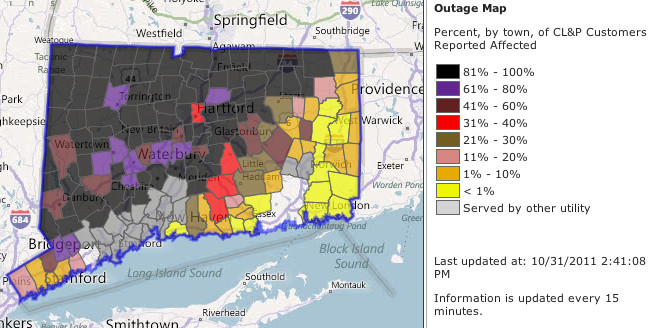
The first day after the storm, I ventured out in my four-wheel drive car in search of candles and information. Our cell tower must have been damaged because not only was there no electricity, but I couldn’t get a signal on my mobile. I slowly made my way toward a nearby shopping area, circumnavigating trees and the wires strewn across the roads, uncertain which wires might be live. There were only a few other cars on the road, and like me, they moved slowly and cautiously.
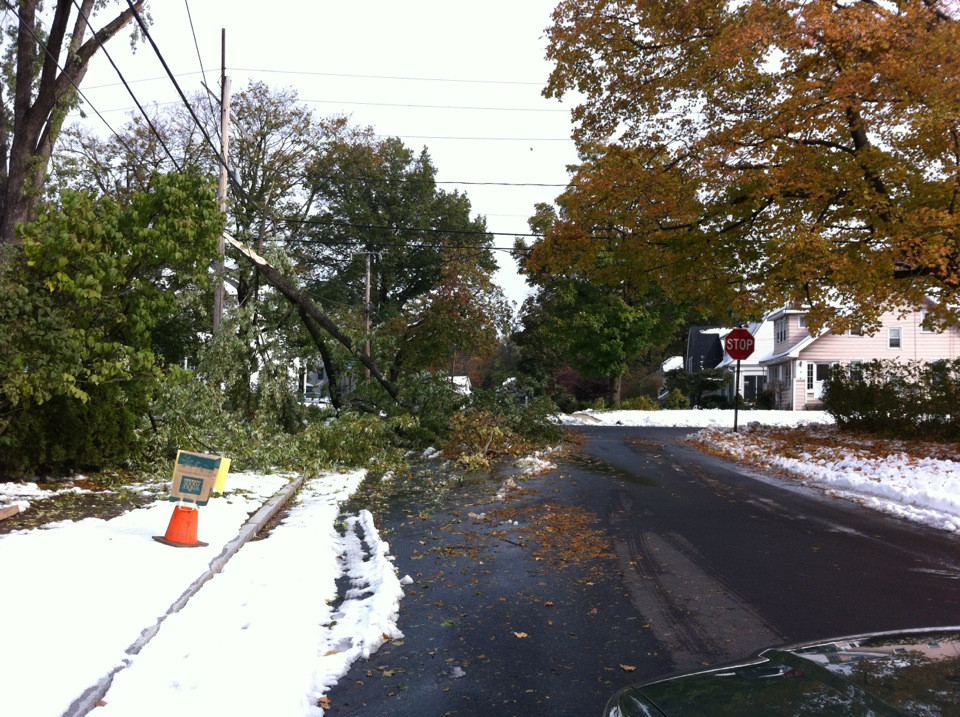
Ready to give up and turn around, I noticed several cars in front of a grocery store. Signs of life. The store had a generator and partial power – some lights, no heat. The half-lit store was eerily empty. A scattering of people perused the canned goods aisles. I picked up a few cans of soup and some candles.
In the checkout line, an elderly gentleman in front of me paid the clerk. He looked frail and not dressed warm enough for the chilly weather. As he picked up his bags, he turned and looked straight at me, and with the kindest voice asked, “Are you ok, ma’am? Are you keeping warm enough?”
His genuine concern and caring was especially touching because I knew on any other day, we would most likely have passed each other without even making eye contact. This is New England where people don’t speak to strangers. When walking down the street, you ignore the people you pass; and on crowded elevators, you look at the floor.
Over the next few days as more and more people ventured out, the roads began to fill with cars. Driving was slow going in the vicinity of the few gas stations that were open. Traffic was backed up for over a mile and it took me 45 minutes to get past the gas station, even though I wasn’t in line for gas.
Signal lights at intersections are out. No one is around to direct traffic. But there are no problems, even at busy intersections. Drivers approach them as four-way stops, courteously take turns. Traffic has flowed smoothly and efficiently.
This is especially striking because on a normal day around here, a left turn at a busy intersection is made at your own risk. People speed up at yellow lights and usually two or three cars will continue through after the light has turned red.
Normally if you’re trying to turn onto a busy street, you are likely to wait a long time. Now when a driver sees someone waiting at a side road, they slow down to let them in.
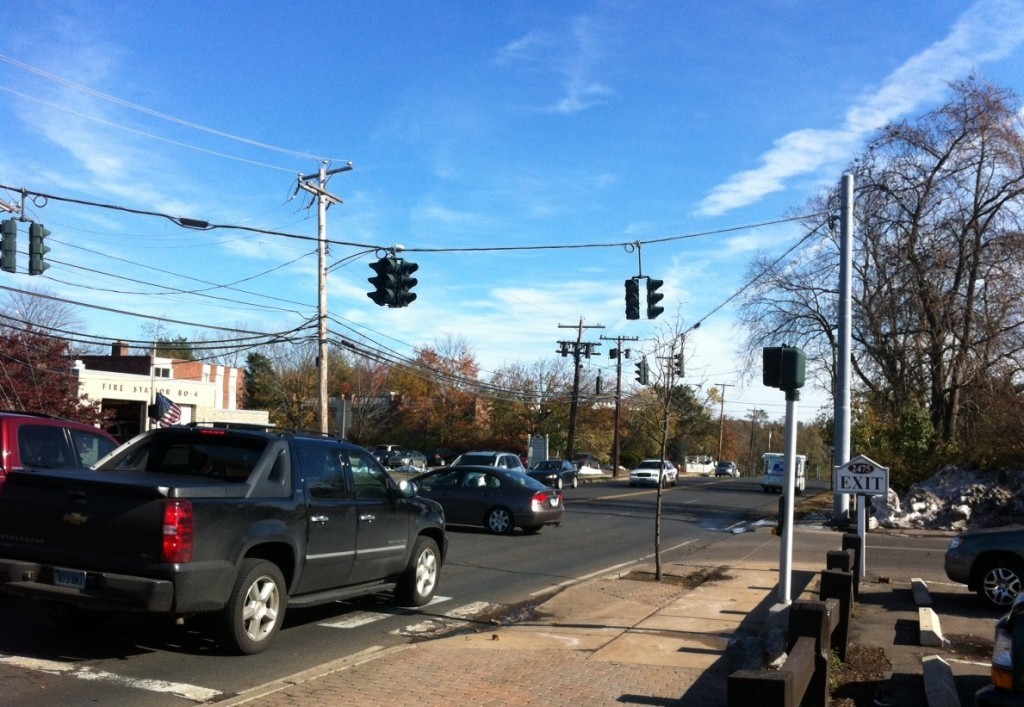
By the third day after the storm, small sections of commercial areas began to get power. Word got out that the Barnes and Noble in West Hartford center had power and free wifi. I drove over there with my laptop and cell phone, hoping to get some work done. The store was filled – people sitting everywhere, at tables, counters and on the floor, their laptops daisy chained to electric outlets.
Once again I was struck by the kindness and courtesy that filled the air. There were no “power hogs.” As soon as someone’s laptop was fully charged, they offered the plug to another.
Hundreds of school children with nothing to do all week are suffering from electronic withdrawal. It has become common to see small bands roving the streets with power strips in search of electric outlets and wifi.
A Starbucks opened and a Panera Bread, and then the local library. Each time, as word got out, the places filled with people desperate to charge their phones and laptops, but always willing to share space and outlet with others.
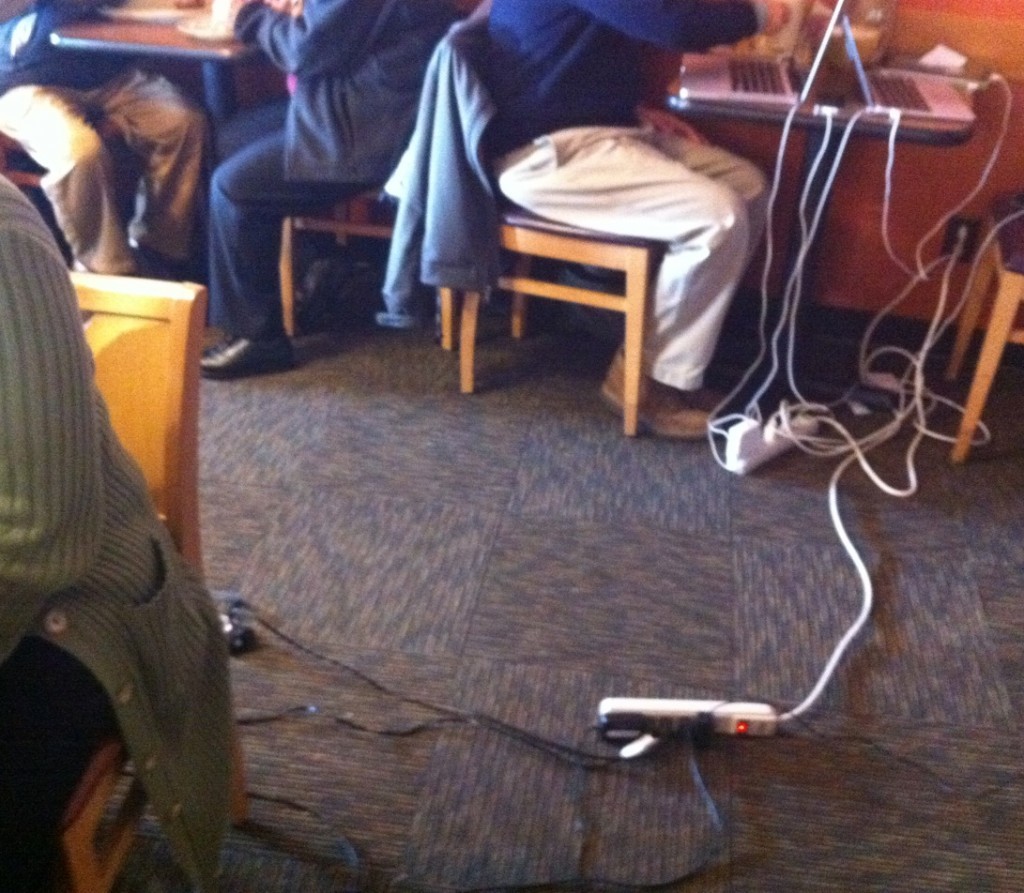
By now, most of the city of Hartford has power, and we can go there for gas, food and entertainment. Movie theaters are filled.
But at night, driving home it’s eerie to cross the Hartford city line – abruptly leaving the comfort of the brightly lit streets suddenly pitched into complete darkness.
Shelters have been set up throughout the state. Fortunately I’ve been able to stay home as I have a gas fireplace that provides enough heat. I’ve enjoyed the quiet evenings in a room lit by dozens of candles, reading as I sit in front of the fireplace. But I haven’t gotten much work done as it’s difficult to concentrate in the noisy Starbucks where everyone’s chatting and swapping stories.
We heard our town will get our power back by tomorrow. They’ve begun the clean up, hauling away the downed limbs and restringing the wires. But it will be a long time before our beautiful trees and yards recover, and a lot of businesses have been hard hit from being closed for a week.
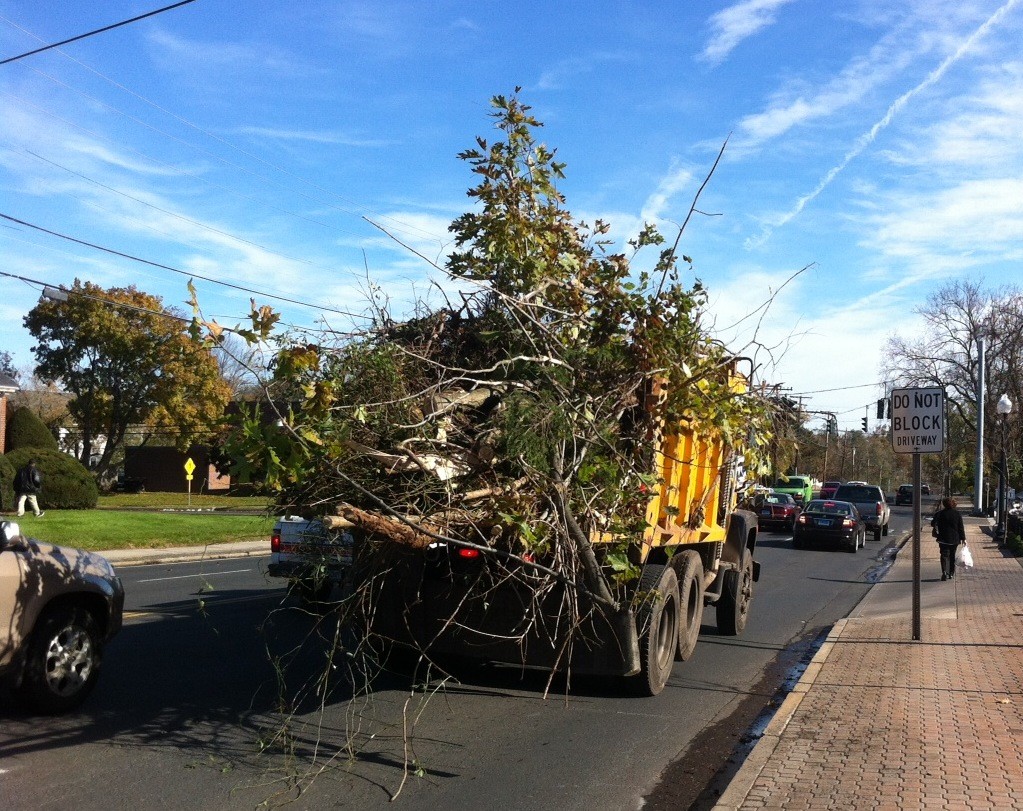
What is the media reporting? Not much as far as I can tell. It doesn’t seem to be big news. My brother, who lives in the Midwest, mentioned he read that fighting had broken out in the gas lines. If that’s true, it’s not something I witnessed.
This entire week, I have witnessed courtesy, compassion and kindness. Society didn’t break down. There was no looting or crime.
In the face of adversity, instead of turning to violence, we turned to each other. Why are these stories not newsworthy?
We are so constantly bombarded by negative images and problems that it is overwhelming. We lose our perspective and stop seeing that there is a force in the universe that moves toward love and goodness.
Yes, I know that terrible things are happening. Injustice needs to be fought. We need to help those in need. We need to stand up to bullies. We need stop pillaging our environment. I believe in the importance of Tikun Olam – repairing the world.
I also know that while we’re fighting to make this a better world, we will get jaded and heartsick if we don’t also remember that love, compassion, connection are available at every turn of the way.
The images we hold in our minds manifest.
I have painted a detailed picture of my experience this week to offer some positive images to counterbalance those that are thrust upon us.
I encourage you to look around. You don’t need to lose your power to see this. Every day there is an act of kindness you might miss if you’re not paying attention.













Jesse,
What a lovely story. Mine is similar. After two days of huddling in front of a very inadequate fireplace in western Mass., I came up to be with my daughter and her family in northern NH. The week spent playing monopoly and dominoes with the grandchildren and listening to them read to me has been very precious. Sometimes the heavens do have to open for us to see the important things in life.
I hope your power returns soon. Ours is still out.
Betsy
Glad to hear you’re safe and keeping warm, Betsy. And thanks for sharing your lovely story. Spending a week playing with your grandchildren sounds precious indeed!
Dear Jesse,
What a lovely written blog. I heard all about the weather and lack of electricity in the Dutch newspapers and on the news. Sometimes I wonder what it would mean if we (myself and our community in the Netherlands) would be in position that we don’t have access to internet and no cellphones to use. A lot of people would be out of work and society would suffer a lot. On the other hand, situations like these will be solved by itself. Funny that I realize that it would be a gift not sit behind a computer and to be reading instead. Or work on a manual typewriter! It would be like a setback in years. Perhaps if that is the case, we have an opportunity to conitnue life with the knowledge we have now and with the values and the speed of life from years ago. Somehow it will do good for us, like you describe in your story. It would be a nice thing for a change to be able to take a step back, reflect and reconsider how we can, should and will live over lives. The challenge is also to do that without such a disaster and still get the same results like you describe. Interesting thought!
Hi Caroline,
I don’t want to paint too rosy of a picture. It has been frustrating in terms of work because the rest of the world hasn’t stopped. Clients expect responses to email and deadlines to be met. Imagine not being able to charge your laptop unless you go out to a restaurant. Not being able to print documents. Not being able to talk on the phone unless you plug it in to your car and sit there with the motor running. I can go somewhere else to work, but all of my materials are in my office.
Maybe if a wider area was affected, it would create a more wide scale change in attitudes and expectations. As it is, I felt like I was trying to run a race with my legs tied together.
What was most striking to me, was that under adversity, peoples’ natural reaction was toward care and concern for each other. I would hope that I’ll pay more attention to the people I pass on the street and in the checkout lines. But I suspect most of us will eventually revert to our regular habits. And whether this last or not is not what’s most important. From my perspective, the striking lesson is that our immediate instinct is toward goodness, to help others, and to make connection. And this reinforces my belief in our potential as a human race.
Hi Jesse,
I’m going out to express compassion to someone.
Thank you,
Dan
Hi Dan, Anyone in particular? Given you are one of the most compassionate people I know, I would challenge you to look closely at someone who has been annoying you.
Nice to see you here. Thanks for dropping by.
Hi Jesse,
As the old preacher used to say… you quit preachin and went to meddlin with your encouragement. 😉
Cheers,
Dan
Jesse, great post and observation. Why is it that we look to sell bad news and we never want to talk about the positive? It is good to hear your version of the truth, and what it does do is create the right kind of thoughts to be carried. “What you focus on expands” and our obsession with the negative is giving us exactly that result. As you say, violent incidents were reported, which you did not experience being there.
South Africa is a classic example of what negative press can do for you. I am not saying we don’t have the violent crime that gets reported on daily, but my concern is that is not all that we have. It is a beautiful country, with beautiful people doing great things, and yet if you have never been here, you would not want to set foot here given the bad press, starting with South Africans themselves funny enough.
Hi Thabo, That’s my big question too, Thabo: why does bad news sell so much better than good news? Maybe it’s some primitive pre-wired circuit from earlier times when fear ensured our survival. But now it seems, it’s not healthy for us humans, individually and collectively, to be driven by fear. It seems we need to make a conscious effort to counteract it and maybe even retrain ourselves. A very interesting book by Rick Hanson, Buddha’s Brain: The Practical Neuroscience of Happiness, Love, and Wisdom, discusses this: http://www.amazon.com/Buddhas-Brain-Practical-Neuroscience-Happiness/dp/1572246952
I love your description of South Africa, and I have heard that some amazing things are happening there. I hope to visit someday. Meanwhile, it’s wonderful to be able to make connections through social media. It really has made this a smaller world for me. Thanks so much for taking the time to comment and connect, Thabo.
Jesse, what a heart-warming piece. Our power came back on in 22 hours. I really appreciated the greater ease in my life, but I missed that camaraderie and helpfulness, even after just a day of it.
Hi Patty, It’s a dubious trade-off, isn’t it? Thanks for sharing your own similar experience.
Hi Jesse — thank you for your words, describing your experience as you move through the storm and its aftermath. I am hoping you have power now, certainly soon. We live in NH and I’ve watched the news (since Wednesday) about CT, the vastness of your outage.
For me, the days without power and internet connection were frustrating…and, eventually, calming. It provided another reminder how connected we can become – or be reminded to become – when we are so “unconnected”. The conversations that unfolded as a result of our “unconnectedness” drew out a compassion and care for neighbors who we knew and didn’t know — just as your experienced at the supermarket checkout lane. Oh, to hold onto that!
Hi Renee, I too moved from frustration to acceptance, which was calming. I’m delighted that my post helped you reconnect with your own similar experience.
I love how you chose to end your story – the call to be present enough to see the opportunities to commit an act of kindness all around us. I had a similar experience in 2004 three months after moving to FL we were hit directly by two Category 3 hurricanes 3 weeks apart. 7 years later what I remember most is the kindness of strangers and the pulling together. In the midst of the aftermath of a storm like this there is that “we are all in this together kind of feeling” and it often brings out the best in people. And then we so quickly go back to our busy lives and lose the present moment and the connection it allows for. What might our world be like if we lived like we were “all in this together” every day?
Thanks for sharing your own experience, Susan. What a welcome to your new home that was – two major hurricanes 3 weeks apart!
You end with a wonderful call to action, Susan. We have shown we have the potential to respond if we can hold the intention.
Jesse:
Thanks for articulating what many of us in the northeast have been experiencing. While it has been frutrating, there certainly has been a sense of community. I finally escaped to Chicago for my medical conference. I’m guardedly hopeful that power will be restored within the next couple of days.
Larry
Hi Larry, It’s affirming to hear that so many people had similar experiences. Thanks for sharing yours.
HI Jesse,
I love your story of our town during the power outage. I want to save it and send it to my family. My expereince was the same as yours – that the best in people prevailed. And it unfortunately didn’t make the news.
Recent brain research shows our brains have a strong bias toward the negative. This bias evolved over millions of years when danger really was all around us. The most suspicious and wary humans passed on their genes more often. Now it would help our survival to have a positive bias. Our complex world functions best when we look one another in the eye, express good will and share. We have to be intentional for that to happen. Your blog reminded us of that. Many thanks.
Marye Gail Harrison
Hi Marye Gail, It is indeed unfortunate that the news did not highlight the positive experiences that so many have reported in their comments. Our thinking is aligned on our wired alertness for danger. In my response to Thabo Hermanus I recommended the book you referenced, Buddah’s Brain by Rick Hanson, that discusses this phenomenon. I also appreciate that it is possible to rise about this bias by consciously paying attention to the positive things we are missing. One of the goals of my Seapoint Center Facebook Page is to help raise awareness by posting examples of some of the good things that are happening regularly.
Hi Jesse,
Thanks for sharing your story of the modern-day challenge you’ve had to endure for the last week. Two thoughts came to mind while reading your post – 1)how easily we take for granted those people/services who we expect to deliver and be present for our needs/wants and 2)that the real measure of our character is not when our proverbial bellies are full, but how we respond and treat others when faced with unexpected challenges or disruptions to our daily routines.
As you and I have discussed, today’s organizations are more like communities than mere places of work. Looking at how the people affected by this storm have responded to this storm and the impact it has had on their interactions provides a valuable lesson leaders should take note of to ensure their organizations can ride out any storm that comes their way as well.
Hi Tanveer,
The internet and computers are totally integral to the work I do. I felt like I had gone back to the stone age and the rest of the world hadn’t. You’re right that I didn’t realize how much I take it for granted until it disappeared.
I love your point about the similarities between organizations and communities and the lesson inherent for leaders.
Thank you!
This is a beautiful piece, Jesse. Very vividly described and very touching and heart-warming. Definitely news-worthy! I’m glad to be filled in on what you went through.
love,
Tomar
Thanks so much, Tomar, for your kind words. I usually write about aspects of leadership and/or vision. But this seemed appropriate since it’s projecting some positive images into the world. Glad to hear you agree it’s news-worthy!
Jesse-
Finally getting around to catching up on my reading! It was great to read your post and get some positive perspective. Thanks for writing something that’s just encouraging to read. I’m going to go out and pass the encouragement along… and buy a generator. 🙂
Micah Yost
@GroupThrive
Hi Micah, I’m glad my post motivated you to pass along encouragement… it’s so important to be intentional about sharing positive things that are happening.
And thanks for the chuckle…didn’t realize I was making a plug for the generator business 🙂
You so captured what is the spirit of the coming Holidays. So much to be thankful for: a generator, candles, and most importantly,the kindness of strangers. I fly to Hartford tomorrow, just as you fly to India. May kindness flow from both of us to all the strangers we will .
Hi Eileen, Indeed, much to be thankful for… kindness and connection are amazing gifts. I just returned from India last night, a quick turn around and heading to Indiana. So sorry to miss you. I’ll keep my eye out for you in airports. 🙂 Thanks so much for sharing your thoughts.